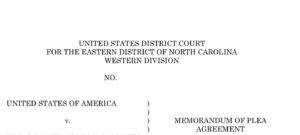A significant number of federal cases involve cooperation by defendants facing long federal sentences or mandatory minimums that can only be removed through cooperation and the filing of 18 U.S.C. 3553(e) motions. Given that federal prosecutions and federal defendants often rely upon cooperation, and given the real dangers that can come to cooperators, the Government and the Courts, as well as defense lawyers, want to protect defendants and clients from retribution.
Setting aside the fact that clients can sometimes exaggerate the danger of cooperation, concerns about safety are real and need to be taken seriously. One important step in this process is protecting cooperators at the beginning of the case through the use of redaction in discovery provided to co-defendants.
Another step is to seek the prosecution against anyone who tries or seeks to harm or retaliate against a cooperating witness.
But a simple step – now implement in the Eastern District of North Carolina – is to require the use of sealed supplements in all plea agreements that state whether or not cooperation is being offered by the defendant. In the past, sealed supplements have been filed, but generally only in cases where cooperation was offered by the defendant. Or the plea agreement containing cooperation language has been sealed entirely.
In order to permit the public’s right to know about a plea agreement, but also to protect the defendant who may be cooperating, October 2022’s Standing Order now requires that the cooperation language be placed in the sealed supplement and that all plea agreements have accompanying sealed supplements so that bad actors cannot tell whether someone has cooperated based merely on the existence or non-existence of a supplement.



